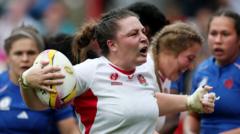How Do RAF Careers Shape England's Plumbing Stars?

Published: 2025-09-26 14:05:24 | Category: sport
In a remarkable blend of sporting prowess and professional dedication, Amy Cokayne is not only making headlines as a key player for England in the Women's Rugby World Cup but also balancing her role as a police officer in the RAF. At 29, she epitomises the evolving landscape of women's rugby, where elite athletes can pursue their sporting dreams while maintaining traditional careers. As Cokayne aims for World Cup glory this Saturday, her journey reflects the significant changes in the sport over the past decade.
Last updated: 20 October 2023 (BST)
Key Takeaways
- Amy Cokayne balances a rugby career with her role as a police officer in the RAF.
- She is part of a generation of players benefiting from the professionalisation of women's rugby.
- Cokayne's journey highlights the challenges and opportunities faced by female athletes.
- England is now one of the few fully professional women's rugby nations globally.
- The upcoming World Cup final represents a chance for England to secure a title on home soil.
The Evolution of Women's Rugby in England
Women's rugby has undergone a transformative journey in England over the last decade. Since the introduction of professionalism six years ago, the landscape has shifted dramatically, enabling players like Cokayne to focus on rugby while pursuing other careers. This professionalisation has not only elevated the standard of play but also allowed athletes to earn a living from their passion.
In the early days of women's rugby, players often juggled jobs alongside their sporting commitments. Many were left with little support, facing the challenge of balancing work and training. The 2014 World Cup victory by England was achieved by an amateur squad, who returned to their everyday jobs shortly after the tournament. For instance, captain Katy Daley-McLean worked as a primary school teacher, while vice-captain Sarah Hunter was a rugby development officer.
Amy Cokayne: A Dual Career
Amy Cokayne's unique position in this evolving scenario is noteworthy. Cokayne, who entered the RAF in 2017, reflects the dual career path that many modern athletes now navigate. "I've never arrested anyone," she joked during a recent interview, highlighting the lighter side of her serious profession. However, her commitment to both rugby and her role as a Flight Lieutenant demonstrates a remarkable balance of discipline and dedication.
The RAF's Elite Athlete Scheme is crucial in supporting Cokayne's aspirations. This initiative allows her to train rigorously and compete at the highest levels while ensuring she has a career to return to after her rugby journey ends. "I still have that career to go back to when I hang up my boots," she stated, reinforcing the idea that professional athletes can indeed have fulfilling careers outside their sport.
The Impact of Professionalism on Women's Rugby
Professionalism within women's rugby has changed the narrative surrounding female athletes. Players now have access to better training facilities, coaching, and financial support, enabling them to focus solely on their sport. England, as one of the leading nations, has capitalised on this change, producing players who are now ranked first in the world.
However, the journey has not been without its challenges. While England's top players enjoy the benefits of professionalism, many others, including those from rival nations like Canada, still face significant hurdles. Canada’s rugby team, though ranked second in the world, has had to resort to crowdfunding to support their ambitions on the international stage.
Personal Stories of Resilience
The stories of players like Marlie Packer and Hannah Botterman exemplify the resilience required in the sport. Packer, who played as a plumber after the 2014 World Cup, recalls the overwhelming support from customers upon sharing her medal-winning experience. Her journey from a trade to the rugby pitch exemplifies the struggles many athletes faced before the advent of professionalism.
Botterman, who considered a career in painting and decorating before receiving her England contract, highlights the difficult choices players had to make. "I was working from 7am until 4pm, then I'd do a night shift," she reminisced, illustrating the demanding lifestyle many athletes endured prior to turning professional.
The Role of the RFU and Support Systems
The Rugby Football Union (RFU) has played a significant role in this transformation. By investing in women's rugby and providing support structures for athletes, the RFU has helped elevate the sport to new heights. The RFU's initiatives have included financial backing, training resources, and increased visibility for the women’s game, all contributing to the growing popularity and professionalism of women's rugby in England.
Looking Ahead: The Future of Women's Rugby
As England prepares for the Women's Rugby World Cup final this weekend, the stakes are high. Players like Cokayne and her teammates have worked tirelessly to reach this point, driven by their passion for the sport and the sacrifices they’ve made along the way. For many, this match is not just about winning a title; it's about showcasing the evolution of women's rugby and the potential that lies ahead.
The upcoming final at Twickenham is not just a culmination of their efforts on the field but also a testament to the hard work, dedication, and resilience of female athletes everywhere. Should England emerge victorious, it will mark a significant milestone in their history and further cement the importance of women’s rugby in the sporting landscape.
FAQs
What is the Elite Athlete Scheme in the RAF?
The Elite Athlete Scheme in the RAF supports athletes who compete at high levels in their sport, allowing them to balance their military careers with their sporting ambitions. This scheme provides flexibility and resources to help athletes excel in both areas.
How has professionalism affected women's rugby in England?
Professionalism has transformed women's rugby in England by providing financial support, better training facilities, and full-time opportunities for athletes, leading to improved performance and increased popularity of the sport.
What challenges do female rugby players face today?
Despite advancements, many female rugby players still face challenges such as balancing work with training, securing funding, and overcoming limited support structures compared to their male counterparts.
What does the future hold for women's rugby?
The future of women's rugby looks promising, with increasing professionalisation, greater visibility, and support from governing bodies. This may lead to more opportunities for female athletes and continued growth of the sport.
What are the benefits of playing rugby for women?
Playing rugby offers women numerous benefits, including physical fitness, teamwork, leadership skills, and the opportunity to compete at high levels, all while fostering a sense of community and camaraderie.
As England's women's rugby team gears up for their World Cup final, the stories of players like Amy Cokayne remind us of the dedication and resilience required to excel in sports while juggling other professional commitments. The evolution of women's rugby not only highlights the progress made but also sets the stage for a brighter future in the sport. #WomensRugby #RugbyWorldCup #AmyCokayne



